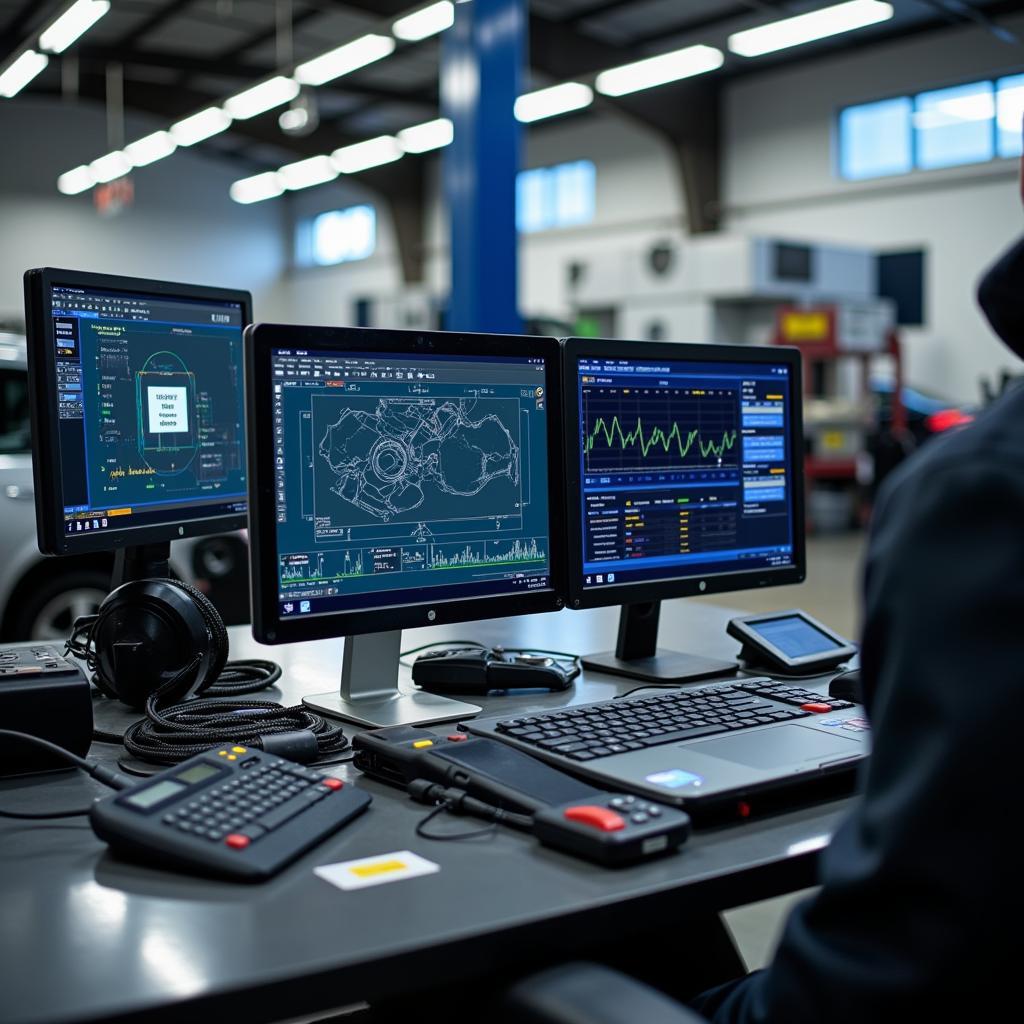Car diagnostics have become an indispensable part of modern vehicle maintenance and repair. No longer a mysterious black box, car diagnostics offer a wealth of information about your vehicle’s health, helping you identify and address issues before they escalate into costly repairs. But navigating the world of car diagnostics can be daunting, especially with the vast array of tools, services, and information available. That’s where booking a car diagnostic comes in. This guide will walk you through everything you need to know about booking a car diagnostic, empowering you to make informed decisions about your vehicle’s well-being.
What Does Booking a Car Diagnostic Entail?
Booking a car diagnostic essentially involves scheduling an appointment with a qualified technician who will use advanced scanning tools to delve into your vehicle’s computer system. These tools retrieve diagnostic trouble codes (DTCs), which are like cryptic messages your car sends when something isn’t quite right.
Think of DTCs as a doctor reading your symptoms. A headache could indicate stress, lack of sleep, or something more serious. Similarly, a DTC in your car might point to a minor sensor malfunction or a more significant engine problem.
Why Should I Book a Car Diagnostic?
Imagine this: your check engine light illuminates, leaving you puzzled and potentially worried. Instead of resorting to guesswork or costly trial-and-error repairs, a car diagnostic appointment offers a clear and efficient path to understanding the issue.
Here’s why booking a car diagnostic is a smart move:
- Accurate Diagnosis: Pinpoint the root cause of vehicle problems, from engine misfires to faulty sensors.
- Preventative Maintenance: Identify potential issues early on, preventing costly breakdowns and extending your vehicle’s lifespan.
- Cost Savings: Avoid unnecessary repairs by targeting the actual problem area revealed by the diagnostic scan.
- Improved Performance: Address underlying issues that might be affecting your car’s fuel efficiency, performance, or emissions.
- Peace of Mind: Gain a comprehensive understanding of your vehicle’s health, allowing you to make informed decisions about maintenance and repairs.
What to Expect During a Car Diagnostic Appointment
A typical car diagnostic appointment involves the following steps:
-
Connecting the Diagnostic Scanner: The technician will connect a specialized scan tool to your vehicle’s OBD-II port, usually located under the dashboard on the driver’s side.
-
Retrieving Diagnostic Trouble Codes (DTCs): The scanner retrieves DTCs stored in your car’s computer, each code representing a specific issue or system malfunction.
-
Interpreting and Analyzing DTCs: The technician will decipher the meaning of each DTC, considering your car’s make, model, and year to pinpoint the problem area.
-
Further Inspection and Testing: Depending on the DTCs and symptoms, the technician might perform additional inspections, visual checks, or manual tests to confirm the diagnosis.
-
Explanation and Recommendations: The technician will explain the findings in clear, understandable language, providing recommendations for repairs, maintenance, or further action.
Choosing the Right Place to Book Your Car Diagnostic
When selecting a place to book your car diagnostic, consider these factors:
-
Reputation and Experience: Look for reputable shops or dealerships with experienced technicians specializing in car diagnostics for your vehicle’s make and model.
-
Equipment and Technology: Ensure the facility uses up-to-date diagnostic scanners and equipment compatible with your vehicle’s systems.
-
Transparency and Communication: Choose a provider that prioritizes clear communication, explaining the process, findings, and recommendations in detail.
-
Pricing and Estimates: Inquire about the cost of the diagnostic service upfront and request written estimates for any recommended repairs.
 Advanced Car Diagnostic Tools and Equipment
Advanced Car Diagnostic Tools and Equipment
Tips for a Smooth Car Diagnostic Experience
-
Gather Information: Note down any unusual noises, warning lights, or performance issues you’ve observed to provide the technician with valuable context.
-
Ask Questions: Don’t hesitate to ask the technician about the diagnostic process, the meaning of DTCs, and their recommendations for repair or maintenance.
-
Get a Second Opinion: If you’re unsure about the diagnosis or recommended repairs, consider getting a second opinion from another reputable shop or technician.
Conclusion
Booking a car diagnostic is a proactive approach to vehicle maintenance, offering a window into your car’s health and allowing you to address issues before they escalate. By understanding the process, choosing a qualified provider, and actively participating in the diagnostic experience, you can make informed decisions about your vehicle’s well-being, saving time, money, and unnecessary headaches down the road. Remember, a well-maintained car is a safe and reliable car, and booking a car diagnostic is a step in the right direction.

Leave a Reply